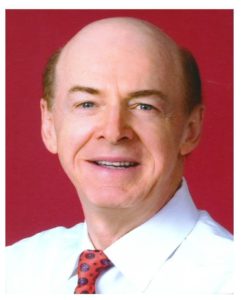
Tony Ruprecht, the former MP and Minister of Citizenship and Multiculturalism of Ontario province. Photo credit: Facebook account of Tony Ruprecht.
Editor’s note: At the end of this summer, the Kazakh Ministry of Foreign Affairs and the country’s Chief Editors Club announced the winners of the Kazakhstan Through the Eyes of Foreign Media international contest. Among the winners was Tony Ruprecht from Canada, the former MP and Minister of Citizenship and Multiculturalism of Ontario province, and Inga Cernei-Kelner, the President of United Communities of Canada and Member of National Ethnic Press and Media Council of Canada.
In their video, they speak about the importance of Kazakhstan for Canada and explain why people should plan a visit:“Canadians will find many areas of interest there: the beauty of the mountains, of nature, of its cities and of different economic sectors that are really unique, such as the space industries, technology, robotics and digital technology, energy and high-tech enterprises and the ongoing shift to adopting a green economy.”
Previously, AT published an article by another contest winner, Dr. Mehmood UI Hassan Khan (Pakistan) “Abai Kunanbaiuly: The Man With a Strategic Vision”.
The transcript of the video is published below.
Hello, I’m Tony Ruprecht, the former Minister of Citizenship and Multiculturalism. Thirty years ago, on the 16th of December of 1991, an important event took place in the history of mankind – the independence declaration of Kazakhstan. That was a significant mark of history and we are here today not only to celebrate it but to send a clear message to all the nations. Kazakhstan is an important country to us and we have many similarities.
For instance, Kazakhstan is home to people of many ethnic backgrounds and various cultures. Just like Canada, Kazakhstan developed a social program of constructive diversity among culturally and racially communities. This view embraces the best of Kazakhstan: its fairness, compassion, and freedom. It rejects the worst of humankind: prejudice and discrimination. That is why we are very excited to have closer relations with Kazakhstan; especially in terms of expanding trade, culture and education, professions, and investments in various sectors of the economy.
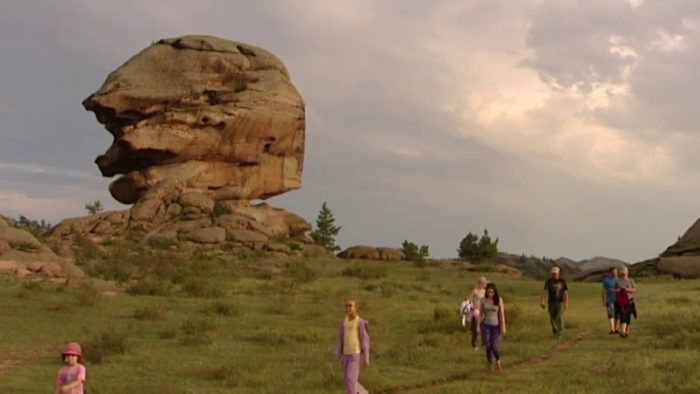
Video fragment: Kazakh people are walking alongside picturesque rocks of Bayanaul National Park, Pavlodar region.
Most people know that Kazakhstan is the ninth largest country in the world. It is arguably the most dominant nation of Central Asia with the strongest performing economy. It is a democratic secular constitutional republic with a diverse cultural heritage similar to Canada, and that would be a significant milestone that our two nations amalgamate to share its history with the rest of the world. And so, my friends, I am delighted to speak to you today on behalf of Canada, and, hopefully, on behalf of all the different multicultural communities. As we say: “Let us work together to become stronger nations within the United Nations.”
We want Canadians to know all about Kazakhstan, not only how progressive it is, but also striking in its regional capacity. Canadians will find many areas of interest there: the beauty of the mountains, of nature, of its cities and of different items that are really unique, such space industries, technology, robotics and digital technology, energy and high-tech enterprises and a shift to a green economy. Imagine, all of this could be had if you and I, for that matter, would to visit this wonderful and beautiful country you’re about to see. So, I hope you enjoy this great video.
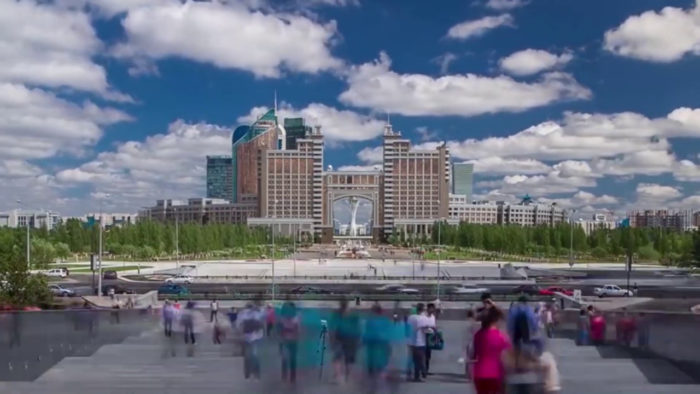
Video fragment: View on the Lovers’ Park, Nur-Sultan city.
Olga Zelenina says: “I have never been to Kazakhstan, but having attended Nauryz in Toronto, which is the day of spring nature renewal and beginning of a new life, I discovered a lot about Kazakhstan and I’m ready to share it with you. Nauryz is the major holiday celebrated for more than five thousand years as New Year, which aligns with the real astronomic event called vernal equinox. The first words I heard were: “Welcome to Kazakhstan. If you want to get to know interesting traditions, beautiful nature, unique combination of Asian and modern cultures, you don’t need to travel the whole world, just come to Kazakhstan. All the guests and visitors are always welcome, so you will feel the true hospitality of the country located at the very heart of Eurasia.
The Republic of Kazakhstan is located at the very heart of Eurasia and appeared on the geopolitical map only in 1991. Kazakh, the word of Turkic origin, means “a free person” and Kazakhstan is the country which was historically inhabited by freedom-loving nomads. Kazakhstan has become a motherland for people of different nationalities and religions, united by the common historical heritage. The citizens of Kazakhstan are proud of their country. Throughout the centuries, from generation to generation Kazakhstan keeps and maintains a good tradition of friendship between nations.”
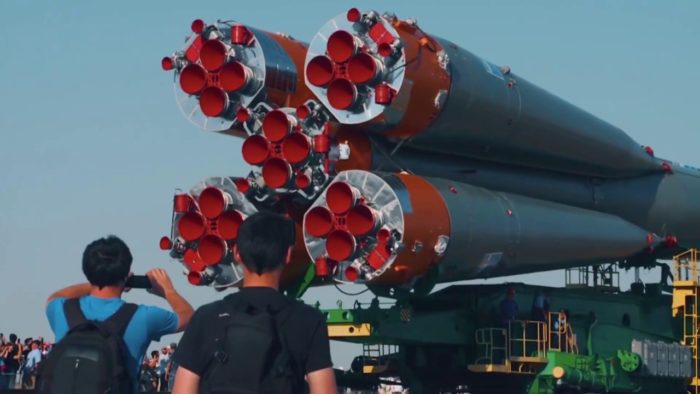
Video fragment: Baikonur Cosmodrome, Kyzylorda region.
Anna Nyrlibaeva says: “Today we have guests from Kazakhstan, Kyrgyzstan, Tajikistan, Turkmenistan, Azerbaijan, Armenia, Russia. We invited all the nations. Each nation tries to bring their traditions, customs and rituals, because these things are like a mirror reflecting the features of national character and culture. There is a desire to give this knowledge and skills to their children, who, in their turn, will share and develop them further.”
Nowadays there are about one hundred thirty nationalities living in Kazakhstan. More than half of them are Kazakhs, one fourth are Russians, and the rest are Ukrainians, Uzbeks, Yugurs, Korean, German, and Tatars. The main religions are Islam and Christianity. The national language is Kazakh. Russian has the status of the language for international communication and is used on equal terms with the national language in government agencies, institutions, and other organizations. As for the rising generation, they are multilingual, and can also speak in English: The Kazakh language is an ancestor language, Russian is for communication, and English is becoming popular as a language for business and for correspondence with foreign guests and visitors.
In spite of the fact that the Republic of Kazakhstan takes the ninth place in the world according to its geographical size, it is still unknown and mysterious for many of people. Even the keenest travelers will discover a lot of interesting and wonderful elements in Kazakhstan – mountain peaks covered with snow, vast highlands, deep rivers, dry deserts, endless flower fields and lush forest reserves.
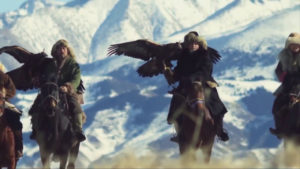
Video fragment: Nomads are hunting with steppe eagles.
The beautiful nature of Kazakhstan is hard to describe by words. In the south, south-east and west, the pure white peaks of the Tian Shan and Altai mountain chains sparkle around. In the west, the country is bordered by the Caspian Sea, the biggest sea-lake in the world. There is also Lake Balkhash in the Saryarka prairies, one part of which has salt water and the other part – fresh water. The Northern Kazakhstan also has a huge variety of beautiful places; here, you can find hundreds of glacial lakes surrounded by Kokshetau pine woods. You will never forget cave paintings and sculptures in the Bayanaul National Park. Korgalzhyn Nature Reserve has more than three-hundred kinds of plants and vast flamingo colonies of the world.
Great importance is given to maintaining nature reserves and national parks and their unique landscapes, as well as protecting animal and vegetation life. From the ecological point of view Kazakhstan is the country with plentiful, diverse, and beautiful nature. Those who love tranquility and zen, as well as impressive landscapes, will definitely appreciate famous resorts with therapeutic muds and mineral springs of Kokshetau state national nature park.
Olga Zelenina says: “I’m looking forward to visiting Kazakhstan and seeing everything with my own eyes.”
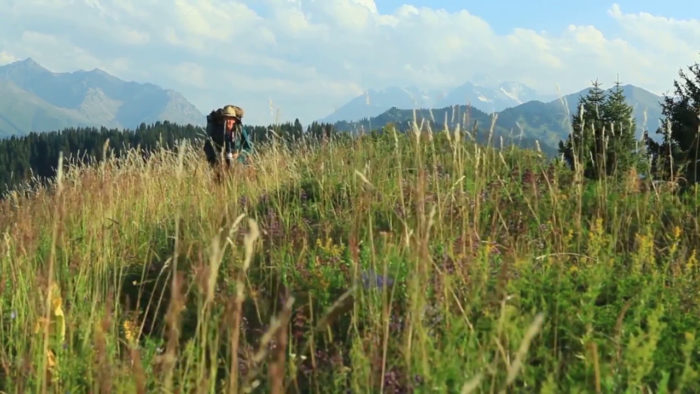
Video fragment: Tian Shan mountains, Almaty region.
Dr. Tony Ruprecht is introducing the President of United Communities of Canada, Inga Cernei-Kelner.
Inga Cernei- Kelner says: “The flags that are here around us represent all the various peoples we have in Canada and where they came from. Dr. Ruprecht, you wrote a very important book for us about our Ethnic Communities. Please tell us a bit more about it?”
Dr. Tony Ruprecht replies: “As you can see this is the book that we have produced, it’s called Toronto’s Many Faces”. This one of many guides to the multicultural character of the city, featuring profiles of more than sixty ethnic communities. Now, the wonderful part about this book is that Kazakhstan is mentioned in the addendum. Why is it in the book? Because people who came from Kazakhstan made a continuous significant contribution to our country and that is the reason why we ensure that people who make a contribution to our country are profiled in this book.” So, anyone who wants to know about Kazakhstan can be informed about this wonderful country.
In fact, Inga, you and I can actually go to Kazakhstan and see the beautiful mountains, and see the brilliant cities, and appreciate the many wonderful things that they have accomplished. So, my friends, if you need to know more about Kazakhstan and its people in Canada, you can get this book; it even includes the phone numbers of the consulate and Kazakhstan Embassy. I’m delighted to have printed this book and I’m also happy to give you a copy of it, Madam President.
Inga continues: “Dr.Tony Ruprecht, you told me there is a good chance to raise the flag of Kazakhstan in front of the Parliament. When will it happen?”
Dr.Tony Ruprecht concludes: “Well, Inga, it is going to happen exactly on the 16th of December this year. We would like everyone to know in Canada that the flag of Kazakhstan will be raised at the Parliament. Everyone who walks by including many politicians will know why this flag is raised in the Parliament district. The reason is simple; it is to honour Kazakhstan and its independence declaration. The second reason is just as important and that is: we have people who came from Kazakhstan to Canada, they are here, they’ve developed their own businesses, and they’ve made a contribution to the growth of our Country. I believe that fact should be recognized.
There is no better way to honour Kazakhstan than to raise their flag in the parliament, also in front of the building, where people walk by and drive by. They will see the flag and ask us questions; “Why today? Why this flag?”, and we have a good answer, we say: “Visit Kazakhstan. That’s why we raise this flag to ensure that people know about it. And that there is a greater communication and a greater appreciation between Canada and Kazakhstan. Together we intend to build a better world, together we can go into the future confident that we know that our values are being respected, and that we are together in this great enterprise of building a harmonious relationship between our two countries.”
«United Communities of Canada»
